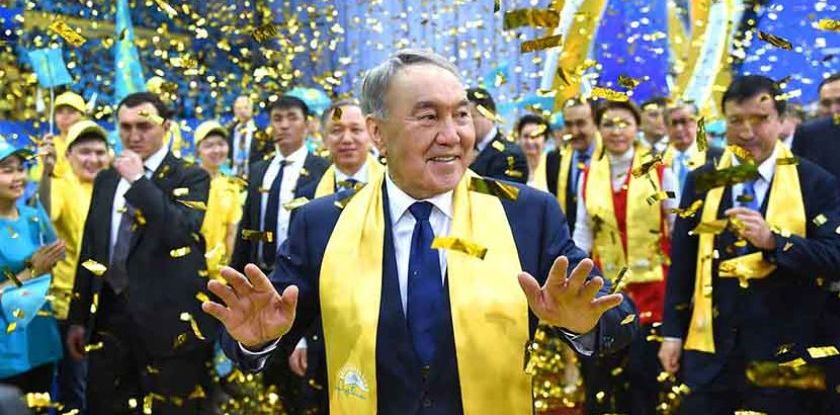Not long before Nauryz (a Kazakh holiday that celebrates spring, the renewal of nature and symbolizes fertility, friendship, and love), the Kazakh TV broadcasted Nazarbayev’s meeting with some carefully selected journalists. This, of course, was not a live program. They had simply broadcasted a previously shot video. Then, the local media rushed to repeat Nazarbayev’s messages.
The reasons why Nazarbayev, unlike his Russian colleague Vladimir Putin, had long abandoned open press-conferences with the Kazakh and international reporters who often ask unexpected questions are well-known. Thus, we will concentrate on the content of Nazarbayev’s address alone.
Among his massages repeated by the press, there are those on his physical and political longevity. To prove his right to retain the latter, Nazarbayev cites Margaret Thatcher and Winston Churchill. Ms. Thatcher, in answer to the question how long she could stay the head of the government, said, “I say until I am tired of it, so long as Britain needs me I shall never be tired of it”. As for Churchill, the Kazakh president says, the British Prime Minister once stated, “I am here not by accident. I am made for this job».
Nazarbayev says he is constantly thinking about what else he can do for his country, he understands his own “necessity” and, since he gets the job done, the president continues working. What is more, de-facto, he does not exclude a possibility that he will be working even after 2020 when his presidential mandate will have expired.
Thus, once again, Nazarbayev confirms that he will remain President for as long as it is physically possible. This, on the one hand, helps to stabilize the political situation in the country because it ties the power shift not with the elections, the possible successors, etc., but with Nazarbayev’s departure from life which may not happen any time soon.
On the other hand, however, this preserves the current political system, the power structure, and the internal political practices in Kazakhstan. In fact, it means that the country is following the USSR footsteps, only instead of Marxism-Leninism, Kazakhstan employs “Nazarbayevism” as the state ideology. It is the belief in his exceptional nature, righteousness, wisdom, and faultlessness.
The problem, however, lies in the fact that Kazakhstan’s economy and social sphere need to change in order to come out of the crisis. This kind of change is now happening all over the world. In that same Russia, the change (albeit a conservative one) started about 10 years ago when Vladimir Putin and a significant part of the Russian elite abandoned their moving towards the West and its democratic values. They set up the goal to revitalize Russia as one of the world centers of influence. Now the same is happening in the UK and the US (albeit for the other purposes).
But is Nazarbayev capable of handling the change in the country?
Even though he had announced the third modernization of the economy, the recent amendments to the Constitution and the political process are too declarative, insignificant, and noneffective to spark the Kazakhs’ interest. But, without such interest, it is impossible to awaken the masses. Although it seems like the president does not want to “wake” anybody.
One can understand this. Nazarbayev and the older generation of his allies remember the fate of the Soviet Union brought to it by the perestroika started by Gorbachev with the best of intentions. Therefore, Nazarbayev had always acted with the greatest care making not even steps but half the steps. And he will continue to do so in the future. The question is will it be enough to kick start the economy.
If, however, everything remains unchanged, the collapse is immanent. And the 1-2% annual GDP growth will not solve the problem. In order to significantly improve the level and the quality of life of the Kazakh, we need a much more substantial growth, and not just in the oil, gas, and metallurgic sectors that employ only several hundred thousand people. Only the national scale drivers can ensure such growth. Out of these drivers, the large-scale investments, the external demand increase, and the active position of the masses seem to be the feasible one.
Now Akorda is feverishly trying to attract possible investors both domestic and foreign. They had tried to mobilize the first by the means the assets legalization. The second are being wooed by the tales of the good investment climate in the country, the Astana off-shore zone, and the political-level lobbying. However, the question of this tactics’ effectiveness remains. By our estimates, the coming of the large-scale investors is not to be expected.
As for the external demand increase, it looks like the hydrocarbons prices, in the next ten years, will fluctuate in the corridor not very different from the current one. In other words, it means that the country will unquestionably lose the competition in the global market since the Kazakh oil, except for the Tengiz variety, is heavier, more complex, and more extensive. Apart from the oil, however, Kazakhstan does not really have anything to offer to the world.
Therefore, in a few years that will be wasted on the attempts to woo the investors, on the realization of the fact that it is impossible to create a good investment climate just by talking and that the oil/gas super profits are now nothing by history, Kazakhstan will start the change. And then, it may turn out that the personal factor will play not just a crucial but a negatively crucial part in the history of Kazakhstan.




